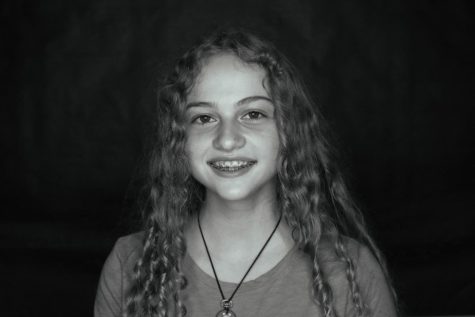
Grace is a sophomore, and this is her second year writing for NA Eye. She's fascinated by Mars, astrobiology, and space travel.
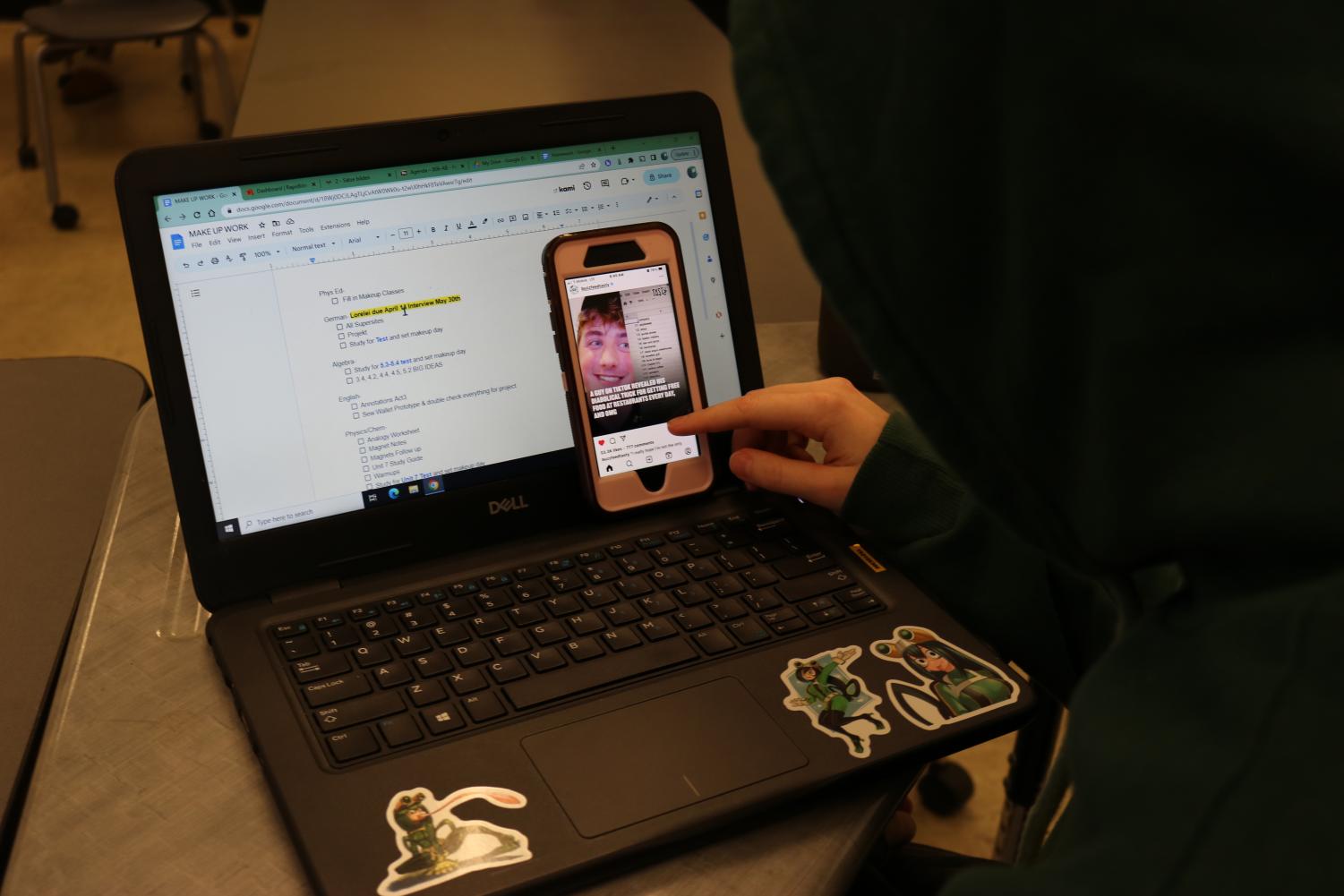

May 9, 2023
“I believe that the ability to completely edit and filter yourself makes an unreal standard of what people should look like. The amount of likes you have on a photo dictates how you feel about it, and comments are basically a way to anonymously hate on people and put them down. I’ve seen many friendships be ruined not only by the things said or shown on social media, but the time spent on it. People would rather snap each other, or make a video together than actually speak to one another. It’s come to the point where if you don’t use social media you’re left out, and not a part of what the world is becoming.”
Across the past few decades, the capabilities of technology have increased tenfold. As the power of social media rises, some questions have risen too–is social media really that harmful? Which platform causes the most harm? And perhaps most importantly, is all of this really worth it? Despite the fact that social media is proven to have the strongest effects on the teenage age group, the voices of older generations are typically the ones most heard when speaking on the issue. Over 50 NAI students shared their own opinions on the pros and cons of social media.
While all apps have their own detrimental effects, some have proven to be much more harmful to mental health than others. When surveyed, 42.3% of all students interviewed stated that TikTok was the most harmful towards their own mental health.
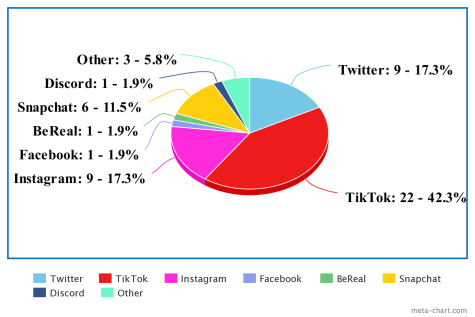
When asked why, three different effects were brought up the most often: an addictive algorithm that disrupts sleep patterns, popular creators setting extremely unrealistic beauty standards, and the rapid spread of harmful misinformation through viral short videos.
“I believe that TikTok is the most detrimental because it can be very addicting. Also along with the other apps, everything you put on there you can’t delete. It will always be there. Even though TikTok is a fun app that you can use with friends, it can also be very harmful because of addiction and the ability to not delete things permanently.”
“I feel like most people are on TikTok, and I know I have seen people commenting negative things about people on it. People post so many fake things on it which cause people to become scared. Another fake thing people post is their bodies. Now not all people who do that are fake, but it causes other people to compare themselves, making them more depressed and it causes a negative ‘beauty standard’.”
“TikTok is the most harmful social media platform because cyberbullying is a high ‘trend’ in comments, Tiktok DMs, and just the videos in general. It also is very addicting and watching for hours and hours can lead to such things as procrastination, sleep deprivation, and feeling fatigue.”
With 17.3% of total votes each, Instagram and Twitter tied for second place. Students who chose Twitter most commonly spoke of the normalization of toxic posts across the website, frequently targeting other users. Twitter’s algorithm, programmed to present frequently interacted with posts across communities (usually arguments) constantly exposes users to hateful speech.
“People are extremely harsh and vicious on Twitter and often share disgusting and plain wrong takes that can damage others and sometimes people are targeted even when they go through hard times. They’re keyboard warriors, and if they were given the chance to tell the person they’re attacking in person, they’d be too scared to do it, and would opt not to.”
“Twitter has the most mainstream collection of people that uses an algorithm that relies on your emotional response, good or bad. A negative reaction, however, is a much stronger emotion which pushes engagement, what it checks for. It promotes these materials because they get a lot of attention rather than their quality.”
Instagram was talked about for the negative ways influencers and the algorithm impact users’ body image. The common usage of filters and photoshop to enhance body traits to an unrealistic level can be incredibly harmful. Some surveyed talked about their individual struggles not tying their self worth to Instagram’s ability to like posts. Oftentimes, they feel pressured to constantly appear the way they do in their most liked posts and constantly live up to the image they created for themselves across the app. Instagram also largely contributes to an increased fear of missing out, according to students. When every outing is posted, students recall feeling like they must change their lives to live up to the highlights of the other lives of their own classmates. Tagging, a feature in which users can link the profiles of people who appear in their posted pictures, can cause feelings of exclusion and isolation.
“Instagram gives a false appearance of life because people only share their best moments, and have the ability to edit them so that they are not reality, they are simply a fantasy. thus giving people false hopes because they will try to be more like the people they are seeing on there even though it’s fake.”
“I feel that FOMO is definitely a big part of how this app gets people so addicted to it, because everyone’s like, ‘Oh, my friends are up to this and that, why didn’t I get tagged/invited? Why am I not in their posts?’ Like, sometimes I just start scrolling through my friends’ posts and feeling more and more left out, and then I scroll more, in order to know what else I was left out of. It’s kind of like a vicious cycle that takes advantage of humans’ weaknesses, fear of being not necessarily alone, but lonely and left out.”
Despite criticisms and mentioned negative effects in the previous chapter, just over half (51.9%) of surveyed students said that they still chose to use the social media platform they believe to be the most detrimental to mental health. 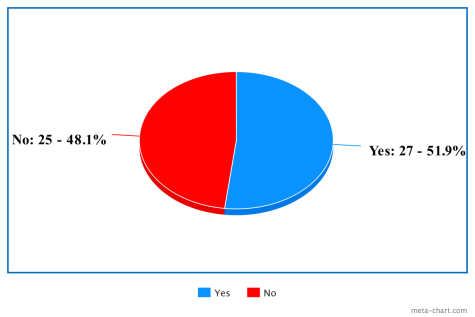
The most common response for students who chose “yes” was a stated fear of being left out. For those who chose TikTok as the most harmful, it was frequently stated that they felt the need to keep the app to be able to stay on top of current trends. Others spoke of how they gained benefits from using the platform in regulation. Regulations helped against TikTok’s purposefully addictive algorithm, with screen time providing a firm barrier against overuse.
“Even though it has negative things, it’s easy to block it out, if you’re able to stay on the right side of TikTok it can actually help you learn and grow in some ways.”
“I continue to use TikTok mainly so I can know all the trending jokes and not feel left out. I’ve added a screen time limit of 30 minutes per day to avoid using it for extended hours.”
Students who chose Instagram said that the social benefits kept them on the app–insights into the lives of their friends and the celebrities they look up to was valuable enough to risk the negative mental effects. A sense of being “in the know” about pop culture topics was very important to students who reported regularly using the app. Without the app’s presence, connections between friends and fan groups would be completely lost. Students combatted the harmful aspects of Instagram by taking precautions after posting their own photos–deleting the app for a few hours or days afterwards.
“I keep using Instagram because I don’t want to miss out on something my friends or any celebrities/sports teams I like post. I also like to post about things even though it can be a source of anxiety because I want to share what is going on in my life. Sometimes after I post I will delete the app for the day or a few hours so I can’t constantly check.”
Other students said they kept the apps simply because it was now mindlessly a part of their routine. While they might prefer to be doing something else, scrolling through social media has become muscle memory to them, and the habit is not easily broken.
“Honestly it doesn’t even feel like a choice anymore- at this point I am using it automatically. I use it when I’m bored or waiting in line, but sometimes I also use it to procrastinate, which can be bad. For precautions, I don’t have any specific ones for the app, but I do limit my screen time and make sure not to follow any questionable accounts, and always fact check everything extreme that I see.”
Pressures to use platforms has kept about half of NAI’s surveyed students on the apps they know to be harmful. While some take precautions to avoid the more toxic parts of apps–screen time limits to avoid overuse, deleting the app after posting to avoid obsessing over audience response–others have given up on eliminating the platforms from their lives entirely. For many, the temptation of instant access to millions of posts and the fear of being left behind outweighs the fear of the platform’s consequences. Others fear the consequences enough to give up the app they believe to be the worst, but stay connected through other apps. With so many different dangers across dozens of available apps, one begins to question if social media is really worth it.
Whether or not the hassle of regulations and the risk of harm was really worth it was split among students. By the difference of 2 people, it was ultimately more popular to say that social media was worth the consequences (51.9% of voters). 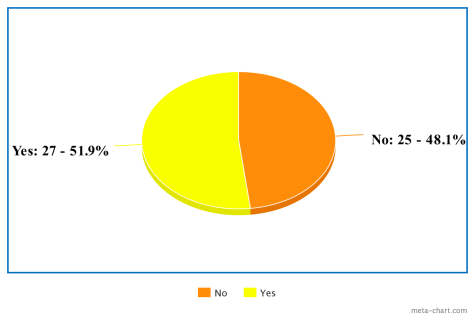 Connection was by far the most frequently brought up benefit of social media. The ability to reach almost everyone within a social circle immediately was highly valuable to students. Some students talked about how this ability to connect helped them throughout the COVID-19 pandemic. In a time where physical distance was necessary, social media helped to fill the void and close the emotional gap between people.
Connection was by far the most frequently brought up benefit of social media. The ability to reach almost everyone within a social circle immediately was highly valuable to students. Some students talked about how this ability to connect helped them throughout the COVID-19 pandemic. In a time where physical distance was necessary, social media helped to fill the void and close the emotional gap between people.
“With technology on the rise, people of all generations look to entertainment, and that may be TV, shows etc. But when it comes to social media, it’s portable entertainment you can access at any time, anywhere, which I think is why it’s so appealing. I think the ability to be able to stay connected to what’s going on anytime, anywhere, is valuable, and it outweighs the negatives.”
“When it comes to making friends on social media, you really have no idea what a person could be like. But when you do come across a few gems and really get to know them, having these platforms becomes a great tool. I myself have maintained a very close relationship with my online friend group since the pandemic- it’s amazing how many similar experiences we share and continue to support each other.”
Other benefits frequently mentioned include how powerful of a tool social media could be. Platforms where millions of people are able to combine forces to conquer a certain task or share their own knowledge on a specific topic have changed the way the world works. Awareness is brought to issues much more quickly–missing people can be found hundreds of times faster if thousands of people are actively working towards their recovery. Tragedy is easily brought to light by just a few influential people through doing something as quick as posting a support link to their story. The importance of social media in sharing prevalent world news was also mentioned. While few teenagers regularly watch the news, as was once expected, the majority can stay updated through simple posts about whatever is currently happening in the world. Breaking news of political conflict or humanitarian crises reach teens through reposted media from major news sites, rather than the news sites or shows themselves. Those living through crises are able to share what they’re experiencing, and nearly immediately reach the eyes of those who have the power to help.
“The fastest way to spread information in today’s age is social media. If there is a missing child, social media will come to the rescue. As well as keeping up to date with the news especially for teens. Just based off of what I see everyday teens are more likely to open a social media app than turn on the tv and watch the news. Therefore, teens and whoever else prefers social media over the news will still be caught up to date on current events.”
Social media also provides an incredibly unique opportunity to share knowledge and skills in a rapid way, to an audience of millions. Many NAI students recalled learning skills such as crocheting across video platforms, or various other forms of art that they wouldn’t have even thought about learning otherwise. Scientific information, like updates on the status of the COVID-19 virus, can be shared in easily-digestible short videos or single-slide posts. Social media has the power to bring understanding of complex concepts rapidly to a diverse group of people.
Students who believe the negative aspects of social media outweigh the positive benefits spoke primarily of how social media’s addictive algorithms took too much from their lives for the platforms to be considered “worth it”–while they may be able to reach anyone at any time, a preference for online chatting has taken away an irreplaceable element of relationships.
“Negatives often outweigh the benefits, in my opinion. I think there are a lot of benefits though so the social media apps should change their apps so it’s less addictive and more friendly that way some of the negatives are eliminated and the positives can be more present. I think there are a decent amount of good things from social media, but they have become too toxic and addictive that the negatives outweigh the positives.”
Others spoke of how platforms with addictive algorithms had taken away from the time that they could have used to be productive or rest, rather than doomscrolling and making themselves increasingly anxious. Hundreds of students at NA are struggling to maintain an ever-growing busy schedule–most find themselves balancing school with a sport, alongside other extracurriculars. Students report that usage of certain platforms takes up many of their precious minutes of free time, and they often regret their choice to scroll when their free time is over. Some believe the solution to this is eliminating social media from their lives completely–every positive aspect can be replaced by non-virtual interactions.
“No matter how many connections you have, or what you use it for. There are always ways to do things offline, maybe even make better and stronger connections. There will always be negativity and false truths with social media. However, you could cut out half of it if you simply put away your phone, or better yet didn’t have social media.”
A few surveyed students also stressed the importance of not grouping every social media platform into one category. Platforms like Snapchat and Discord were set aside as programs with much less cons than Instagram, Twitter, or TikTok.
“I think it depends on the specific app because some, like YouTube and ones more focused on messaging like SnapChat and Discord, have (from what I’ve seen) little problems associated with them when compared to Instagram, TikTok and Twitter.”
Another one of the most frequently asked questions about social media is how far it should go–should it become even more prevalent? Has it gone too far already? When asked if they thought social media had become a near necessity to the world, the vast majority (82.7%) of surveyed students said yes. 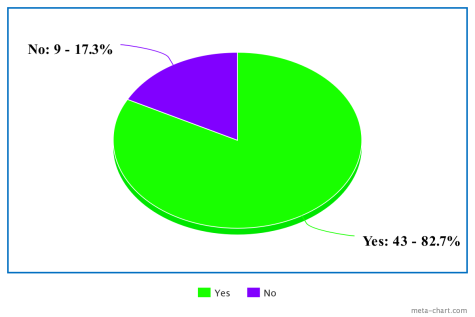
NAI students who believed social media was heavily integrated into society enough to have become a necessity didn’t necessarily agree on whether or not this was a good thing. Social media has become a new outlet for culture, and with how quickly information spreads, that culture is ever-changing. This cultural output has become essential to the creation and continuation of modern pop culture, proving that not all aspects of social media are harmful.
“Yes, because without social media, we’d be living under a rock and social media helps us evolve as a generation when it comes to things like humor, fashion, ideas etc. I do believe it is a good thing as, despite the numerous dangers with social media, it develops a more modern culture that is, for the most part, agreeable.”
Again, connection like the world has never seen before was also brought up as a benefit:
“I feel like most of the time, instead of getting asked for my number, I get asked for my snap or Instagram. A lot of people use social media to cope and connect with other people who go through the same stuff as them. I think that part of it is good. It adds entertainment in your life and as long as you love yourself and don’t allow yourself to fall into that toxic trap, social media is such a good thing.”
“Not only is social media many people’s main form of communication, but it is also a way for people to stay connected when out of school. People who don’t have social media aren’t as capable in staying in touch with their friends, and may even be shunned. I think it’s a bad thing due to all the negative effects social media has on your mental and physical health, but I don’t plan on stopping any time soon.”
Other students said that it wasn’t yet possible to decide if these things were necessarily “good” or “bad”. Some of the aspects of social media are good in moderation, but become harmful after excessive use. The entire topic cannot be completely categorized–there are many gray areas.
“Is this a good thing? I don’t know. It all depends on the way you see it. I think that if we aren’t able to manage the dangers of virtual interactions through social media, it could easily lead into a downward spiral of doom.”
“I think most of society views it as a necessity. It can be a great tool to communicate with others that you would never get the chance to in person, but I think the amount/ way it’s used can become very harmful if in excess over a long period of time.”
“When I see “near necessity”, I think of people’s reactions to their social media accounts being suddenly deleted. Though this may not necessarily be a bad thing, I feel that not only our generation, but also the one before and the ones to come, have become so utterly dependent on platforms and devices that fill all of our spare time and boredom–we wouldn’t even know what to do without anymore. Especially since a lot of us go on our phones to social platforms to express ourselves and avoid in-person awkwardness, things would be a lot different with social media, and many people wouldn’t feel as free to connect as they do now.”
The remainder of students expressed their negative thoughts about social media’s role as a necessity. One of the negatives of social media’s heavy integration into society is the culture of hate it has created. People can be judged by millions of people at once online, and the fear of this has changed the way some NAI students choose to express themselves off of the internet too. Many expressed how they felt a pressure to constantly perform, consistently worrying about posting regularly and getting a positive response to all of their posts.
Every person I meet (about 95%) have social media. It is the thing that all connections revolve around, and all that people talk about. “I saw so and so doing this” and “Can you believe what so and so said”. It’s absolutely not a good thing, if you don’t have it you’re honestly happier, but are left out of most everything. No one wants to go through the effort of actually talking, or even texting. People survived without it, and honestly I’d go back to then If I could. You could be whoever you wanted to be, and you could show who you wanted, but you wouldn’t have to worry about likes, or comments, or any online hatred.

Grace is a sophomore, and this is her second year writing for NA Eye. She's fascinated by Mars, astrobiology, and space travel.